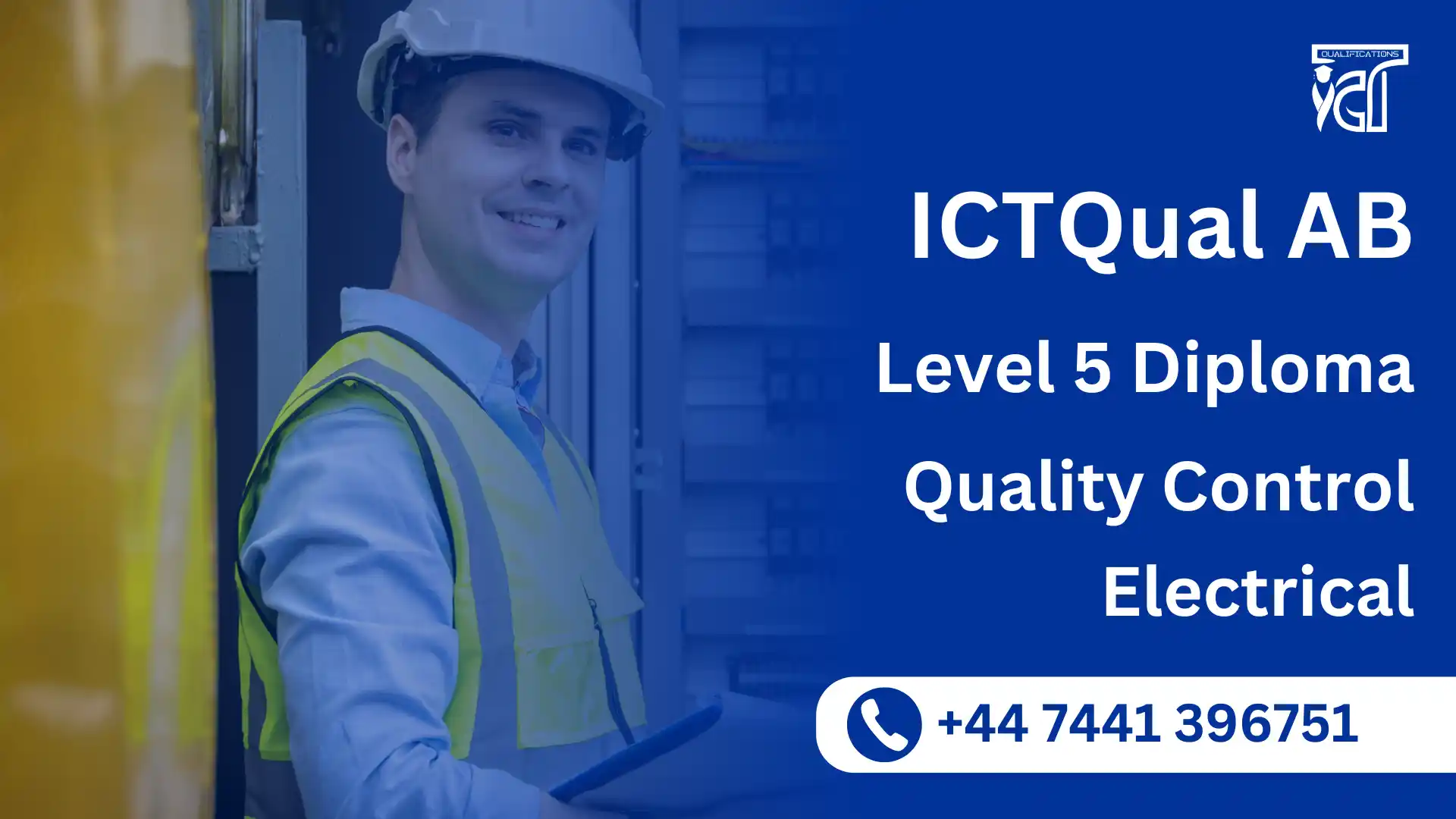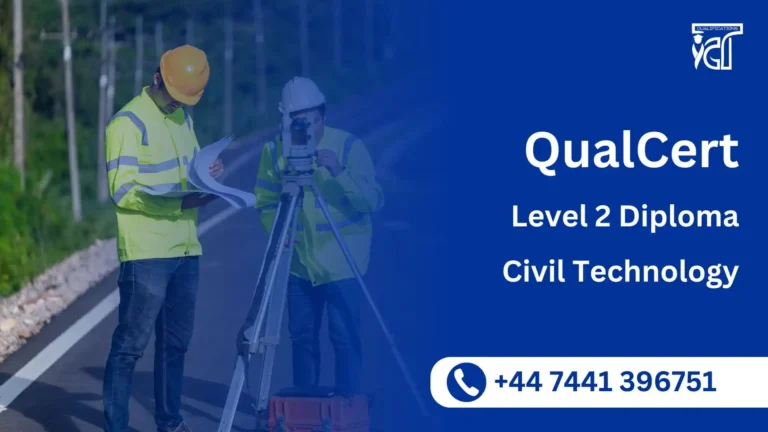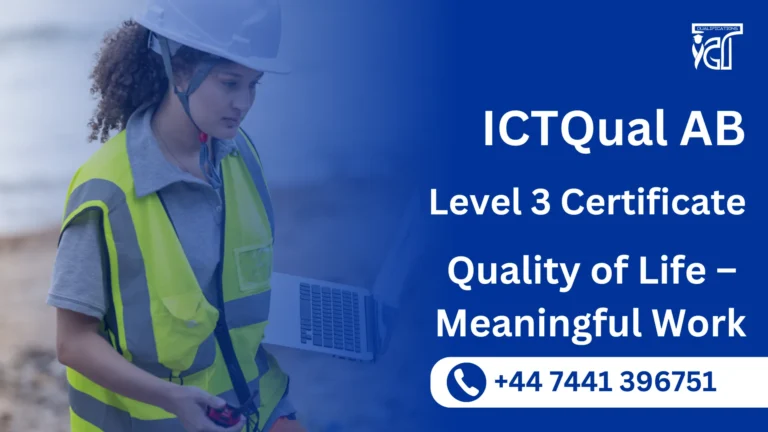The ICTQual AB Level 5 Diploma in Quality Control (Electrical) is an advanced qualification tailored for professionals aiming to deepen their expertise in electrical quality control and assurance. This program is designed to develop higher-level competencies in the inspection, testing, analysis, and regulatory compliance of electrical systems across various industries, including construction, manufacturing, utilities, and energy sectors.
Building on foundational knowledge, the course explores complex quality control frameworks, risk management techniques, advanced inspection tools, and quality assurance planning for electrical projects. Learners will also gain insights into international electrical standards, health and safety regulations, and quality audit practices.
This diploma is ideal for individuals seeking supervisory, managerial, or specialist roles in quality control. It prepares learners to take on leadership responsibilities, contribute to continuous improvement initiatives, and ensure that electrical systems meet rigorous technical and safety standards in high-stakes environments.
ICTQual AB Level 5 Diploma in Quality Control Electrical
This qualification, the ICTQual AB Level 5 Diploma in Quality Control Electrical, consists of 10 mandatory units.
- Integration of Quality Control with Health and Safety Systems
- Advanced Principles of Electrical Quality Assurance
- Risk Assessment and Hazard Management in Electrical Systems
- Complex Electrical Testing and Fault Diagnosis Techniques
- Compliance with International Electrical Codes and Standards
- Quality Control in Power Distribution and Industrial Systems
- Documentation, Auditing, and Regulatory Reporting Procedures
- Supervisory Skills and Leadership in Quality Control Environments
- Quality Planning and Implementation in Large-Scale Projects
- Root Cause Analysis and Corrective Action Strategies
Here are the learning outcomes for each study unit:
Advanced Principles of Electrical Quality Assurance
- Analyse and apply advanced concepts of electrical quality assurance
- Develop strategies to improve quality across electrical projects
- Evaluate quality control models for effectiveness in electrical systems
- Implement quality frameworks that align with organisational objectives
- Identify key performance indicators related to electrical quality
Risk Assessment and Hazard Management in Electrical Systems
- Conduct comprehensive risk assessments for electrical operations
- Identify electrical hazards and implement control measures
- Apply risk mitigation techniques based on industry best practices
- Integrate risk management into quality control procedures
- Prepare detailed risk reports for internal and regulatory use
Complex Electrical Testing and Fault Diagnosis Techniques
- Perform advanced testing on high-voltage and complex electrical systems
- Diagnose faults using analytical and diagnostic tools
- Interpret complex test results to identify underlying issues
- Apply troubleshooting methods to restore operational efficiency
- Evaluate the effectiveness of testing strategies in fault prevention
Compliance with International Electrical Codes and Standards
- Interpret and apply global electrical standards and codes
- Ensure all installations meet legal and regulatory requirements
- Maintain compliance across multi-jurisdictional electrical projects
- Monitor changes in standards and update procedures accordingly
- Support audits and inspections with evidence of compliance
Quality Control in Power Distribution and Industrial Systems
- Assess quality parameters in large-scale power and industrial systems
- Monitor system performance and identify areas for improvement
- Apply inspection techniques suited for industrial environments
- Ensure installation and maintenance practices meet industry benchmarks
- Evaluate supplier and contractor compliance with quality standards
Documentation, Auditing, and Regulatory Reporting Procedures
- Develop and manage accurate quality documentation systems
- Prepare reports that meet regulatory and audit requirements
- Conduct internal and external audits of electrical quality processes
- Implement corrective actions based on audit findings
- Ensure transparency and traceability through structured reporting
Supervisory Skills and Leadership in Quality Control Environments
- Lead quality control teams with efficiency and professionalism
- Manage workflows and delegate tasks within quality departments
- Motivate teams to achieve quality targets and compliance goals
- Resolve conflicts and improve team communication
- Support continuous professional development in quality control staff
Quality Planning and Implementation in Large-Scale Projects
- Design and implement quality management plans for complex projects
- Coordinate with stakeholders to align quality objectives
- Monitor quality performance throughout the project lifecycle
- Manage resources effectively to meet project quality standards
- Review and refine quality strategies to ensure long-term success
Root Cause Analysis and Corrective Action Strategies
- Investigate quality failures using root cause analysis methods
- Identify systemic issues affecting electrical performance
- Develop and implement effective corrective and preventive actions
- Monitor the effectiveness of corrective strategies over time
- Promote a culture of accountability and continuous improvement
Integration of Quality Control with Health and Safety Systems
- Align quality assurance processes with health and safety regulations
- Coordinate safety and quality audits for comprehensive compliance
- Address overlaps between safety risks and quality defects
- Promote safe working practices through integrated management systems
- Evaluate the impact of health and safety on overall quality outcomes
Benefits of the ICTQual AB Level 5 Diploma in Quality Control Electrical
- Advanced Technical Expertise
Deepen your knowledge of electrical quality control systems, advanced testing methods, fault analysis, and regulatory compliance. - Career Progression Opportunities
Qualify for senior roles such as Quality Control Supervisor, Electrical QA/QC Inspector, or Project Quality Manager in industries like construction, energy, and manufacturing. - Leadership and Management Skills
Gain the ability to lead quality teams, conduct audits, and implement quality assurance plans at the organizational level. - Industry Recognition
Earn a diploma that is respected by employers and recognized in both local and international job markets. - Improved Compliance and Risk Management
Learn how to manage and mitigate risks related to electrical installations by enforcing industry standards and best practices. - Preparation for Further Qualifications
Use this diploma as a stepping stone to higher-level certifications or degrees in quality management, electrical engineering, or project management. - Increased Employability
Enhance your profile with a qualification that demonstrates your commitment to high standards, technical accuracy, and workplace safety. - Real-World Application
Apply theoretical knowledge to practical scenarios, including on-site inspections, quality documentation, and client reporting.
Who is the ICTQual AB Level 5 Diploma in Quality Control Electrical Best Suited For?
This course is best suited for:
- Experienced Electrical Technicians and Engineers
Professionals seeking to upgrade their knowledge and take on more advanced responsibilities in quality control and assurance. - Quality Control Inspectors
Individuals already working in quality roles who want to specialize in the electrical domain and move into senior or supervisory positions. - Project and Site Supervisors
Those responsible for overseeing electrical work and ensuring compliance with safety and quality standards on construction or industrial projects. - Diploma or Degree Holders in Electrical or Related Fields
Learners who have completed a Level 3 or Level 4 qualification in electrical engineering, electronics, or a relevant discipline and wish to advance their career. - Professionals Aiming for International Opportunities
Those seeking employment in countries or companies where formal qualifications in electrical quality control are valued or required. - Career Changers with Technical Backgrounds
Individuals from related technical or engineering backgrounds who want to transition into quality control within the electrical sector.
Entry Requirements
Register Now
Qualification Process
Qualification Process for the ICTQual AB Level 5 Diploma in Quality Control Electrical
- Self-Assessment:
Begin by evaluating your eligibility to ensure you meet the qualification requirements, including work experience, knowledge, and language proficiency. - Registration:
Complete your registration by submitting the required documents, including a scanned copy of a valid ID, and paying the registration fee. - Induction:
An assessor will conduct an induction to confirm your eligibility for the course and explain the evidence requirements. If you do not meet the criteria, your registration will be canceled, and the fee will be refunded. - Assignmnets & Evidence Submission:
Provide all assignmnets and the necessary evidence based on the assessment criteria outlined in the course. If you are unsure of the required evidence, consult with the assessor for guidance on the type and nature of evidence needed. - Feedback and Revision:
The assessor will review your submitted evidence and provide feedback. Evidence that meets the criteria will be marked as “Criteria Met,” while any gaps will be identified. You will be asked to revise and resubmit if needed. - Competence Evidence:
Submit final evidence demonstrating that all learning outcomes have been met. This evidence will be marked as “Criteria Met” by the assessor once it is satisfactory. - Internal Quality Assurance (IQA):
The Internal Quality Assurance Verifier (IQA) will review your evidence to ensure consistency, quality, and compliance with standards. - External Verification:
The IQA will submit your portfolio to ICTQUAL AB External Quality Assurance Verifiers (EQA) for final confirmation. The EQA may contact you directly to verify the authenticity of your evidence. - Certification:
Upon successful completion of all checks, ICTQUAL AB will issue your official certificate, confirming that you have attained the ICTQual AB Level 5 Diploma in Quality Control Electrical.







